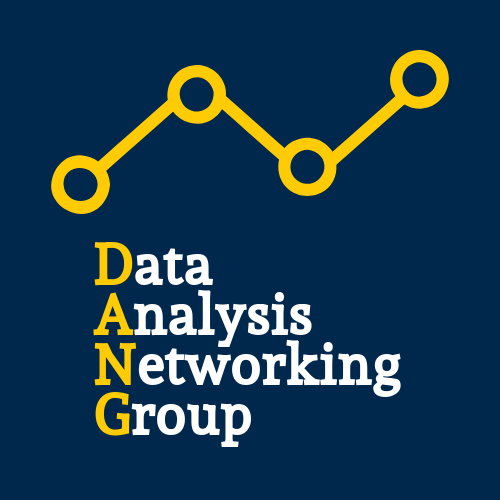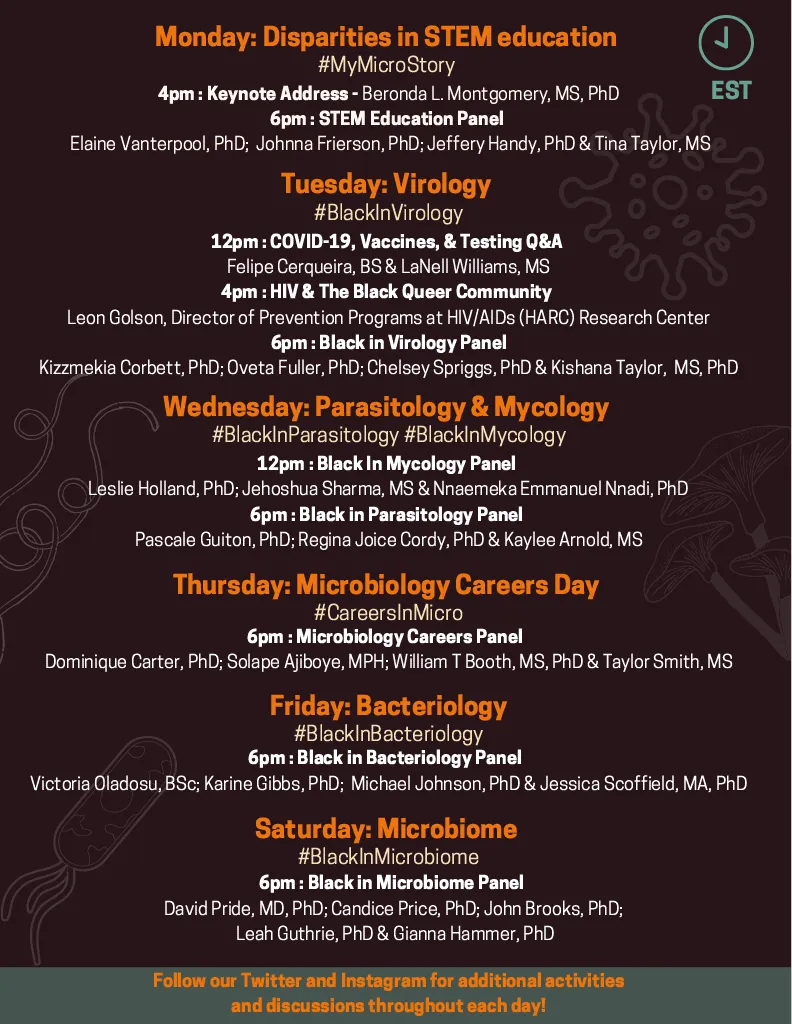Events
See our upcoming and past events below. You can also view our events feed at the UMich Events Calendar.
Many of our events and tutorials are now asynchronous in response to the pandemic. Check out our YouTube channel for the latest videos from the DANG! community.
Past Events
- Oct 2020: Organizing Projects for Reproducibility
- Sep 2020: BLACK IN MICROBIOLOGY WEEK
- Aug 2020: Intro Data Science with Python
- June 2020: Help & Networking Social
- May 2020: Data Science from the Bottom Up
- Apr 2020: Help & Networking Social
- Mar 2020: Viral Community Metagenomics
- Feb 2020: Snakemake
- Jan 2020: Docker
- Dec 2019: Help Desk
- Nov 2019: Looping in R
- Oct 2019: Machine Learning Pipelines in R
- Sep 2019: Conda on the Cluster
- Aug 2019: Making FUNctions in R
- July 2019: Help & Networking Social
- May 2019: An Introduction to Cytoscape
- Feb 2019: Transitioning from Flux
- Apr 2019: Literate Programming
- Mar 2019: Making UNIX Yours
Oct 2020: Organizing Projects for Reproducibility
Monday, Oct 26, 2020 | 4-5pm | Virtual Meeting |
Repro-Packs: Organizing Projects for Reproducibility… and Headache Prevention!
Making your research projects reproducible ensures that anyone, whether that’s another scientist reading your publication or you six months from now, can use the same methods and data to find the same results. Reproducible research is not only a good practice to validate results and to allow others to build off prior work, it also makes your life easier when you need to update software, try out different parameters in a pipeline, or find bugs in your code! A reproducibility package (“repro-pack”, coined by Lorena Barba) is a collection of all the data, code, and figures used to produce the results of a research paper in an automated fashion. We’ll walk through an example of how to organize a project as a repro-pack and share it online so your work will be maximally reproducible.
Presented by Kelly Sovacool
GitHub repo: repro-packs
Sep 2020: BLACK IN MICROBIOLOGY WEEK
Sept. 28 - Oct. 04 | https://blackinmicrobiology.org
Aug 2020: Intro Data Science with Python
Monday, Aug 24, 2020 | 4-5pm | Virtual Meeting | Video Recording
A Gentle Introduction to Data Science with Python
Python is a capable and free (open source) programming language well-suited for analysis of data, including microbiome data. Together, we will go through a real-life example, re-analyzing microbiome - immune checkpoint inhibitor studies. We will touch on both the basics (loading in data, transforming, graphing, basic statistical analysis, and outputting data and figures), and use the examples to compare and contrast with some equivalents in R. This introduction should be suitable for those with no data analysis with code experience, but have some added dimensions for those familiar with R. Presented by Jonathan Golob
GitHub repo: intro-python-16S-analysis
June 2020: Help & Networking Social
Monday, June 22, 2020 | 4-5pm | Virtual meeting
Do you have a problem that you’ve encountered in your analysis but haven’t resolved yet? Have a bug you just can’t seem to squash? Have an analysis idea but don’t know how to do it? We want to help! Use this form to submit a problem you have that we can cover during this session. Bring your code/data OR come to network and help others at this informal help session!
May 2020: Data Science from the Bottom Up
Monday, May 18, 2020 | 4-4:30pm | Virtual meeting
Data Science from the Bottom Up: Computer Memory and Basic Data Structures
How do computers store and organize information? Starting from bits and bytes, we will explore how the most basic units of data are encoded in a computer. We then will look at how computers organize random access memory. Finally we will go over some of the basic data structures used by programs to keep track of information: arrays, linked lists, and hashes.
Data Science from the Bottom Up is a series covering the basics of computer science. How do computers store information? Run calculations? Sort and filter? We start from the silicon and move our way up. Understanding the basics can help you understand better why some code run quickly and some code is slow.
Presented by Jonathan Golob
Apr 2020: Help & Networking Social
Monday, Apr 27, 2020 | 4-5pm | Virtual meeting
Can’t get that graph to look right? Frustrated with data cleaning? Want to squash bugs in your code and help others do the same? Bring your code/data OR come to network and help others at this informal session!
Mar 2020: Viral Community Metagenomics
Monday, Mar 23, 2020 | 4-5pm | Virtual meeting
Introduction to Viral Community Metagenomics
In this presentation, we will go over the steps required to analyze community composition using metagenomics. Topics covered will include read quality control, assembly, binning, and classification. While this talk is framed around analyzing viral communities, the principles also apply to the study of other populations, including bacteria.
Presented by Will Close
GitHub repo: viralMetagenomicsPipeline
Feb 2020: Snakemake
Monday, Feb 24, 2020 | 4-5pm | THSL 2901
Intro to Snakemake
Join us as we learn about snakemake – a workflow management system used to create reproducible and scalable data analyses. We will cover an overview of the snakemake utility and the basics of the framework, create a simple example, and touch on a few key features that make snakemake an excellent choice for building workflows.
Presented by Chris Gates & Travis Saari
Access the materials on GitHub: intro-to-snakemake
Jan 2020: Docker
Monday, Jan 27, 2020 | 4-5pm | 5623 Med Sci II
Intro to Docker
Presented by Jonathan Golob
Dec 2019: Help Desk
Monday, Dec 09, 2019 | 4-5pm | 2901 Taubman Health Sciences Library
Can’t get that graph to look right? Frustrated with data cleaning? Want to flex your skills and help others? Join us for our Holiday Helpdesk on Monday December 9th! Bring your code/data OR come to network and help others at this informal session!
Nov 2019: Looping in R
Monday, Nov 18, 2019 | 4-5pm | 5623 Med Sci II
Looping in R: for loops & the apply family
Come join us to learn about a fundamental coding concept: looping! Core concepts include the basics of for loops, alternatives to for loops in R (vectorization, the apply family), and suggestions on when to use for loops vs. apply statements in R.
Presented by Stephanie Thiede
Access the materials on GitHub: loops-apply-r
Oct 2019: Machine Learning Pipelines in R
Monday, Oct 28, 2019 | 4-5pm | 2903 Taubman Health Sciences Library
Machine Learning Pipelines in R
Join us as we learn how to use the caret R package to develop machine learning (ML) pipelines. Core concepts will include: an overview of ML, best practices for developing ML models, and using caret to develop your own ML models.
Presented by Begüm Topçuoğlu
Access the materials on GitHub: machine-learning-pipelines-r
Sep 2019: Conda on the Cluster
Monday, Sep 23, 2019 | 4-5pm | 2901 Taubman Health Sciences Library
Conda on the Cluster
Come join us as we learn how using Conda can help you better manage programs and create reproducible analysis pipelines while working in any environment, including the new Great Lakes cluster. Core concepts will include: what is Conda, what are best practices for using Conda, and how can you adapt Conda for use in your own research.
Presented by Will Close
Access the materials on GitHub: conda_on_the_cluster
Aug 2019: Making FUNctions in R
Monday, August 26, 2019 | 4-5pm | 5623 Med Sci II
Making FUNctions in R
Presented by Zena Lapp
Access the materials on GitHub: writing-functions-r
July 2019: Help & Networking Social
Monday, July 29, 2019 | 4-6pm | 5623 Med Sci II
Stop by with data analysis questions, meet the DANG! team & community, and grab a snack!
May 2019: An Introduction to Cytoscape
May 20, 2019 | 4-5pm | Room 5623 Med Sci II
An Introduction to Cytoscape: A tool for network visualization
Presented by Justin Joque, PhD - Visualization Librarian
Feb 2019: Transitioning from Flux
Feb 18, 2019 | 4-5pm | Room 5623 Med Sci II
Transitioning from Flux to the new high-performance Great Lakes Cluster
Apr 2019: Literate Programming
Apr 22, 2019 | 4-5pm | Room 5623 Med Sci II
Literate Programming: Creating reproducible reports using RMarkdown
Presented by Zena Lapp
Mar 2019: Making UNIX Yours
Mar 25, 2019 | 4-5pm | Room 5623 Med Sci II
Making UNIX Yours: Improving data analysis workflow through bash customization

